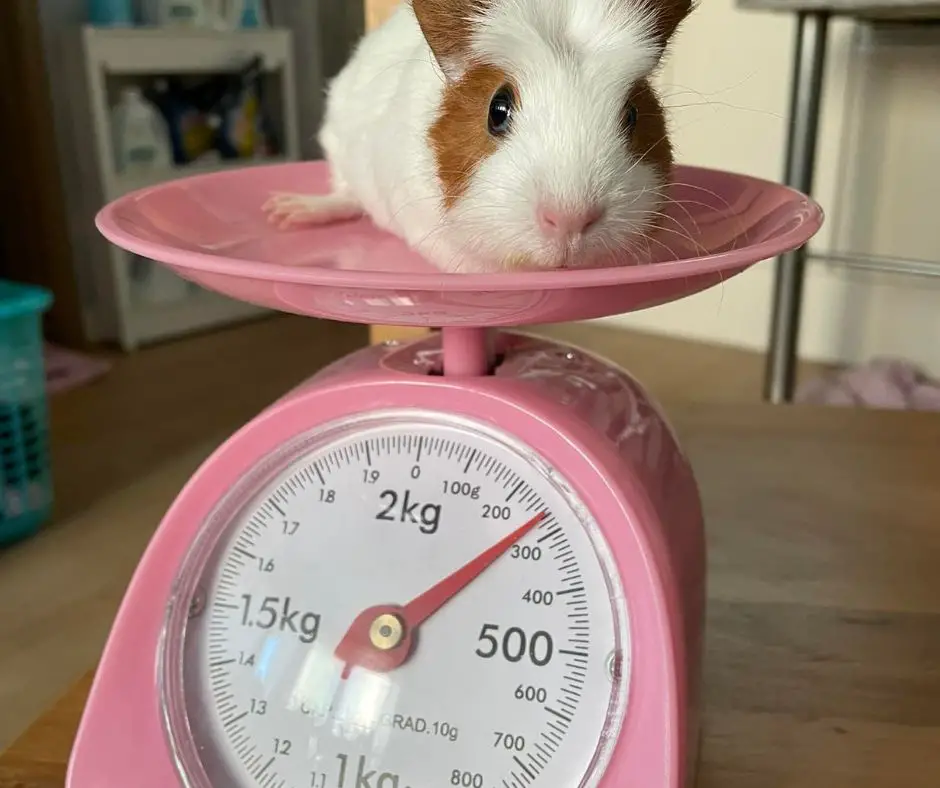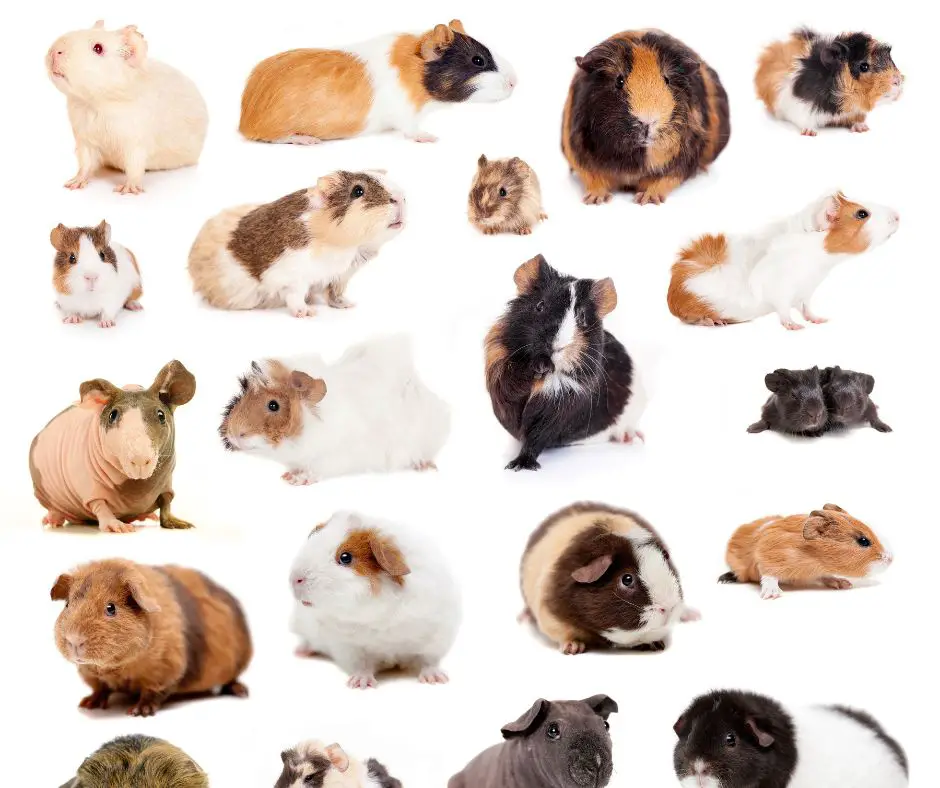Average Guinea Pig Weight – How Much Should a Guinea Pig Weigh?
The guinea pig skeleton is unlike those of other animals such as dogs, cats, and rabbits. That’s why determining the body condition score of a guinea pig is challenging for owners.
It is essential to keep guinea pigs at a healthy weight since overweight or under-weight guinea pigs are prone to a variety of health concerns. So, the pet parents should know how much a guinea pig should weigh?
This article will discuss the average weight of different breeds of guinea pigs at various stages of life as well as how to identify skinny or fat guinea pigs.
How Much Should a Guinea Pig Weigh?
A baby guinea pig’s average weight on the first day is 80 to 100 grams, and after 12 to 16 weeks, he or she achieves adult weight. In terms of size and weight, male guinea pigs are larger and heavier than females.
A male’s typical body weight is 900 to 1200 grams, whereas a female’s average body weight is 700 to 900 grams.
Some guinea pigs have gained more weight than the average or standard weight, but this is uncommon.
Guinea pigs are energetic animals who keep their weight in check by running, walking, and playing. However, as they become older, their weight rises due to a decrease in physical activity.
Also read: Baby Guinea Pigs: Everything You Need to Know

Average Guinea Pig Weigh by Age
To keep a guinea pig fit and smart, you must know the standard or average by age. Weight gain or loss in guinea pigs might be an indication of disease.
Guinea pigs are not as large as rabbits, but they are larger than hamsters. So, here’s how much guinea pigs weigh at different ages.
| Age | Weight | Length |
| Birth | 80 to 100 grams | 2 to 3 inches |
| 4 weeks | 250 to 400 grams | 4 to 6 inches |
| 8 weeks | 400 to 650 grams | 6 to 8 inches |
| 12 weeks | 700 to 900 grams | 8 to 9 inches |
| 16 weeks | 900 to 1000 grams | 9 to 11 inches |
| 14 months | 1000 to 1200 grams | 11 to 12 inches |
Average Guinea Pig Weigh by Breeds
Guinea pigs’ average weight and size vary depending on the breed. Rex is the largest guinea pig that may be kept as a pet, weighing between 800 and 1600 grams on average.
The Ridgeback is the smallest guinea pig, weighing between 700 and 1100 grams.
| Guinea pigs | Baby weight | Adult weight |
| American guinea pig | 80 to 100 grams | 700 to 1100 grams |
| White-crested guinea pig | 80 to 110 grams | 1000 to 1200 grams |
| Abyssinian | 85 to 105 grams | 900 to 1350 grams |
| Peruvian | 80 to 110 grams | 900 to 1400 grams |
| Silkie | 80 to 110 grams | 800 to 1200 grams |
| Coronet | 85 to 105 grams | 700 to 1350 grams |
| Texel | 85 to 110 grams | 900 to 1200 grams |
| Sheba | 100 to 110 grams | 800 to 1200 grams |
| Teddy | 85 to 110 grams | 900 to 1400 grams |
| Skinny | 60 to 110 grams | 700 to 1100 grams |
| Baldwin | 80 to 110 grams | 800 to 1200 grams |
| Rex | 110 to 150 grams | 900 to 1650 grams |
| Ridgeback | 80 to 100 grams | 700 to 1100 grams |
Also read: Guinea Pig Size Guide With 4 Factors You Must Know

How To Tell If Your Guinea Pig Is Overweight
An obese guinea pig appears to be a round, squishy object. An overweight guinea pig ribs, shoulder, and hip bones are not visible.
You can feel these structures by applying pressure on your fingers. Aside from that, the guinea pig will be lethargic and slow to walk.
An overweight guinea pig is also called an obese guinea pig. Obesity renders guinea pigs more vulnerable to illnesses like heart disease, diabetes, and joint problems.
Obesity is caused by consuming too much fat, carbs, and in certain cases, autoimmune problems.
Regular exercise and a limited food supply are the most effective ways to lose weight and overcome obesity.
A vet can help you create a diet menu for your obese guinea pig. Follow the menu and exercise and play with your pet on a regular basis.
Also read: Fat Guinea Pig (Causes & Dangers of Health)

How To Tell If Your Guinea Pig Is Underweight
An underweight guinea pig ribs, hip, and spine joints are plainly evident. These bones can be felt when you touch the guinea pig. A guinea pig is considered underweight if it loses more than 5 or 10% of its body weight.
Being Underweight can be caused by a variety of factors, including underlying diseases, loss of appetite, a poor diet, digestive issues, and a negative energy balance.
Underweight is most commonly caused by severe diarrhea caused by contaminated food.
If the guinea pig has a disease, it must be treated in order for it to regain its normal weight. After that, provide fresh veggies and guinea pig’s favorite goodies.
To get a multivitamin supplement for your underweight guinea pig, consult a veterinarian.
Also read: How to Help a Guinea Pig Gain Weight
How To Weigh My Guinea Pig
You can weigh guinea pigs by using a gram scale that may be mechanical or digital. Weigh a box with four sides closed, then place the guinea pig in a box and weigh it on the gram scale.
The weight of your pet is calculated by subtracting the weight of the box from the overall weight (box + box with guinea pig).
Guinea Pig Scale
Wrapping Up
Because guinea pigs grow at varying rates, their weight and size vary from breed to breed.
Adult guinea pigs, on the other hand, weigh between 900 and 1200 grams and measure between 8 and 12 inches in length.
Exceeding this weight range can be a sign of being overweight or underweight. Guinea pigs can face some health problems if this condition persists. Owners need to monitor the weight of guinea pigs regularly to promptly adjust the diet.







